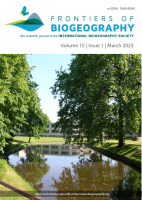“Species–area models now frequently include habitat heterogeneity. These models often fit real-world data better than those that exclude this factor. However, such models usually link the effects of habitat heterogeneity and study area. Critically, we show that difficulties in quantifying habitat heterogeneity within these models can lead to distortions of the apparent effect of area on species richness. Here, we derive a model that minimises these distortions by partitioning the influence of habitat heterogeneity from that of area, without compromising ease of application. This ‘jigsaw model’ achieves this by assuming that different habitats within an area can support similar numbers of species. We compare the behaviour of this model to that of existing models of similar complexity using both simulated island ecosystems and 40 published empirical datasets. The effects of habitat heterogeneity and area on species richness vary independently in our simulations, and these independent effects are recovered by the jigsaw model. This flexibility, however, is not present when the same data are analysed using other models of similar complexity. When applied to real-world data, the jigsaw model demonstrates that the relative importance of area and habitat heterogeneity varies depending on the study system. The jigsaw model provides the best fit to real-world data (according to AICc) of all tested models in logarithmic form, and the second best fit, after the choros model, in power-law form. Our results demonstrate the importance of partitioning the effects of habitat heterogeneity and area on species richness in biogeographic models. The jigsaw model is a simple but powerful tool for such partitioning. It has the potential to elucidate the underlying drivers of species richness patterns, and to be used as a tool in biological conservation projects, where data are often incomplete” in Frontiers in Biogeography

